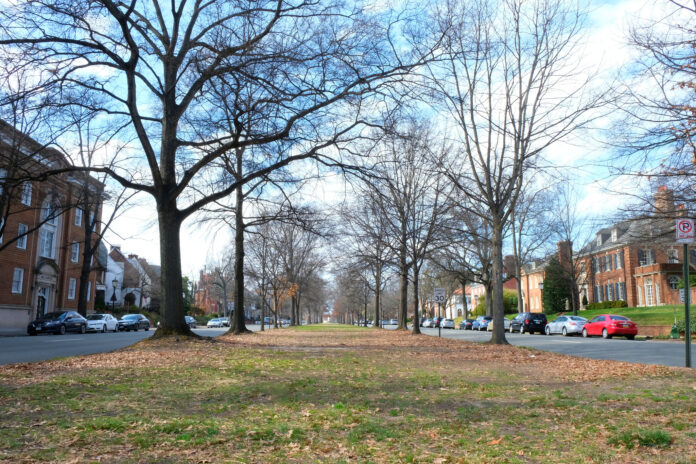Legislation aimed at increasing tree canopies across Virginia passed both chambers of the General Assembly after legislators compromised on removing language around equity.
A tree canopy is the layer of tree leaves, branches and stems that can be viewed from above, according to the U.S. Department of Agriculture. Canopies can reduce air pollution; decrease heat by providing shade and provide wildlife habitats, among other benefits.
Sen. Dave Marsden, D-Fairfax, sponsored Senate Bill 537, which passed the Senate 23-17 and the House 77-18. The legislation this year was amended to strip out the language that referenced adding trees in previously redlined areas and urban heat islands, issues which have traditionally disproportionately impacted Black communities.
The bill gives localities the option to require developers to replace or preserve existing trees in particular sites through minimum requirements. For example, a developer would have to make sure that 10% to 20% of a site is covered by tree canopy, depending on how the site is zoned and how many units there are per acre. Trees that are planted then have 20 years to grow into a canopy that exceeds 5 feet in height.
If developers can’t place trees on-site due to a lack of space, they can be planted elsewhere in the locality.
The developer would deposit the money used for planting into a state Natural Resources Commitment Fund in circumstances where canopies cannot be planted anywhere else in the locality. The funds would then be distributed to rural areas where they would be planted along streams to reduce runoff and increase water quality, Marsden said.
The legislation could help combat rising levels of deforestation within the state, according to Marsden.
Tree canopy cover has decreased by 17% in Virginia since 2000, according to Global Forest Watch, which uses satellite data and algorithms to access information about forest change. “The reason we need trees is to protect our water, to keep our environment cooler and sequester carbon,” Marsden said. Marsden also said that trees are essential for silviculture, which includes the growing and cultivation of trees for timber production.
This bill expands legislation also introduced by Marsden that passed during the 2021 session. The measure only allowed for localities along the Chesapeake Bay watershed or with a population density of at least 75 persons per square mile to implement these requirements.
A key component of this former legislation mentions localities can exceed tree canopy requirements under special circumstances, including developments that impact former redlined areas. Federal housing policies in the 1930s allowed banks and insurance companies to deny loans or services to people in certain “redlined” neighborhoods, which usually had a sizable Black population.
Sheri Shannon is the co-founder of Southside ReLeaf, a community tree planting organization for residents in South Richmond. She said the intentional devaluation of land and property has led to crumbling infrastructure in these areas.
Former redlined neighborhoods can be up to 12 degrees hotter than other parts of the same city, according to a study on the effects of historical housing policies and resident exposure to urban heat. This is because of the higher number of heat-absorbing surfaces like asphalt and a lack of tree canopies and green spaces. These areas are also referred to as urban heat islands.
Residents living in urban heat islands are more vulnerable to a variety of health issues, and excessive heat can result in above-average rates of mortality, according to the Environmental Protection Agency. Shannon said differences can be seen when comparing these neighborhoods to historically affluent white areas like Monument Avenue, which has a vast tree canopy stretching for miles.
According to Marsden the new Republican majority doesn’t agree with changing legislation based on previous inequities. “They want things, you know, available to everybody or that everybody is treated equally,” he said. “As opposed to going back and trying to fix decades or century-old inequities and problems by giving certain groups or geographical areas additional resources based on that previous inequity.”
Lawmakers recently knocked down a proposal to update state law that considered how future development could affect water quality for communities that historically have been economically or socially disadvantaged. The General Assembly also voted to strip citizen air and water boards of permitting power and keep it under authority of the Department of Environmental Quality.
Shannon supported Marsden’s bill but emphasized the consequences of taking out language including redlined areas.
“When you remove language around neighborhoods that need investment, what you’re saying is you trust those in positions of power to make equitable decisions,” Shannon said. “It’s great that people want to have that faith, but history has not always shown us that.”
Peggy Sanner, Virginia executive director at the Chesapeake Bay Foundation, worked with Marsden on the bill. She said the opportunity for building canopies in former redlined areas still exists under circumstances when developers can’t create canopies on-site. The locality in theory could require them to plant the trees in a particular area which was previously redlined.
Shannon said she wants to make sure that once these investments are made in urban forestry, state and local leaders are doing what is necessary to make sure that more people are not being left behind.
Del. Keith Hodges, R-Essex, worked with Marsden to adjust provisions in the bill relating to tree preservation, which will be deferred until next year’s session because of the challenges it presents to developers, Sanner said. Stakeholders will meet at least two times before the session to come up with recommendations.
Sanner said preserving existing trees is ideal because they can take a long time to grow, but it’s more manageable for developers to cut down all the trees in a site and replace them in different areas.
“Passage of SB537 is significant,” Shannon said. “It is important for us to celebrate that victory, but we also have to recognize that we are doing this for people.”
– Meghan McIntyre / Capital News Service

